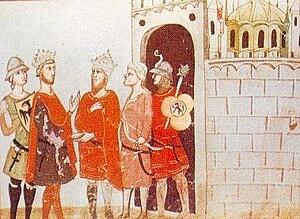The Sixth Crusade

The Sixth Crusade was of monumental importance to Europe as it managed to achieve what previous Crusades had failed to do – recapture the Holy Land. Considerably less fighting was involved in this Crusade, rather it was the diplomatic manoeuvring by the Holy Roman Emperor, Frederick II of Hohenstaufen, which achieved the desired outcome and saw the Kingdom Of Jerusalem regain control of Jerusalem and other surrounding areas for the next 15 years.
The Crusade - which began seven years after the failed Fifth Crusade – was brought about by Frederick, who sought to assuage his guilt at his lack of leadership of the Fifth Crusade by launching the Sixth Crusade to recover Jerusalem, paid for by Holy Roman Empire funds.
While he had been encouraged to take a more definite leadership role in the Fifth Crusade by Honorius III and later Gregory IX, Frederick had declined and was eager to make amends. As his power as Emperor grew, the Pope became increasingly angry at the Papacy's power decline and excommunicated Frederick, citing as the reason his failure to participate in the Fifth Crusade despite promising to do so.
Sailing first to Cyprus in order to gain a strong base prior to launching the planned attack on Egypt, Frederick and his army hit trouble along the way following a dispute with John of Ibelin which forced them to depart earlier than planned. They sailed onto the Holy Land soon afterwards, realising upon arrival that the army was smaller than the one which took part in the Fifth Crusade – a fact which led them to believe launching an attack on the powerful Ayyubid Empire would be a foolish mistake.
Frederick then tried another tactic. He approached the sultan of Egypt, Al-Kamil and was dishonest about the true size of the army that accompanied him, telling him that it was far larger than it was. Frederick hoped that this would lead to the recovering of Jerusalem through diplomacy. As Al-Kamil was preoccupied with a rebellion in Syria, he agreed that Jerusalem, Nazareth and several other small towns would be returned to Christian control, in exchange for a decade-long truce.
Frederick and his army had achieved what four previous crusades had failed to do and he entered Jerusalem on 17 March 1229 under the terms of the peace treaty. Following this triumph, he was hailed a hero and the Pope soon lifted the excommunication
Many believe that the key accomplishment of the Sixth Crusade was highlighting the evident decline of the Papacy's power. It was the first major crusade not to be backed by the Church. Frederick’s success in recapturing the Holy Land changed the course of history as it led to the later Seventh and Eighth Crusades following in the same vein. Each of these were led by single kingdoms keen to emulate the triumph of the Sixth Crusade, rather than by a union of several kingdoms, as had been the case in the unsuccessful first Crusades.
Despite the glory enjoyed by Frederick and his Sixth Crusade, the Holy Land was conquered by the Turks just fifteen years later in 1244.
See also: The Seventh Crusade
MLA Citation/Reference
"The Sixth Crusade". HistoryLearning.com. 2025. Web.
